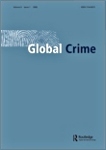New release: Anticorruption for Eastern Europe. Edited by Diana Schmidt-Pfister and Holger Moroff
23. June 2010
Special Issue, Global Crime 11, 2 (2010).
reference
with:
- Holger Moroff; Diana Schmidt-Pfister: Anti-corruption movements, mechanisms, and machines - an introduction. In: Global Crime, 11, 2 (2010), 89-98.
reference
Anticorruption programmes, projects and campaigns have come to constitute an essential aspect of furthering good governance over the last two decades. This article provides a conceptual framework for studying anticorruption efforts and it assesses their nature and impacts across Eastern Europe by focusing on the interplay between the international and domestic domains.
[T]hree levels of analysis - domestic civil society, national governments and international society - provide a meaningful general basis for comparing a variety of anticorruption efforts. On all three levels, political and material interests of relevant actors are complemented by normative arguments.
In assessing the case studies in this volume, this article concludes that, at the interfaces of the three levels, coincidental and spontaneous breakthroughs have largely outweighed systematic implementation of appropriate anticorruption strategies. It further stresses that broad societal support for anticorruption remains essential for the success of any international or governmental initiatives. (abstract)
Dr. Diana Schmidt-Pfister is research associate at the Center of Excellence. Research Project “Scientific Integrity in the Context of Integration and Competition”
